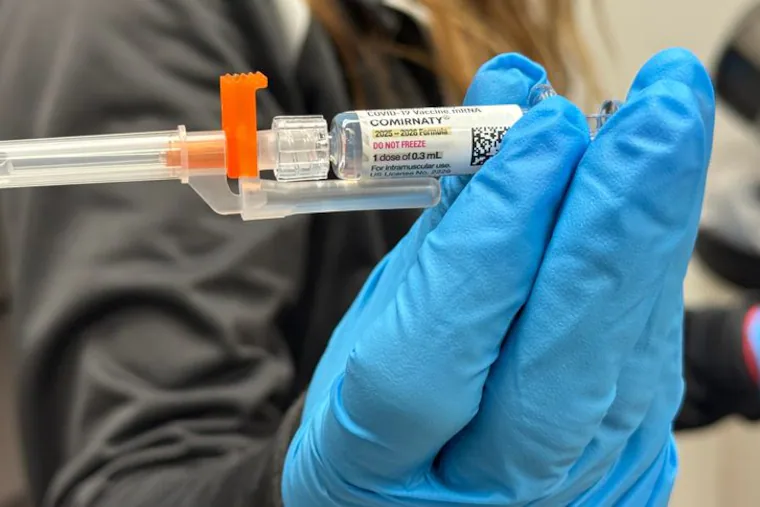
After a confusing COVID-19 vaccine rollout earlier this fall — when new federal restrictions delayed pharmacist from dispensing the shots — shots are now available for older adults and people who risk severe complications from the virus.
That’s in part due to new rules instituted by Pennsylvania’s Board of Pharmacy, which broadened guidelines on how pharmacists dispense vaccines. An executive order in New Jersey also allowed anyone in the state six months and older to get the vaccine.
But some pharmacists have been unable to order free COVID vaccines for under- or uninsured patients because of ongoing federal regulatory delays.
Mayank Amin, who runs Montgomery County’s Skippack Pharmacy, estimates he is providing about 300 COVID vaccines a day, comparable to the demand last year.
He told The Inquirer he has not been able to order free doses of the vaccine through a federal program called Vaccines for Children. Likewise, he said, state officials have informed him that free vaccines for uninsured adults are also currently unavailable.
Some experts are worried about future vaccine availability, given recent shake-ups at the Centers for Disease Control and Prevention and skepticism in President Donald Trump’s administration about long-established immunizations like the measles, mumps, and rubella vaccine.
Here’s what you need to know about getting vaccinated this fall for COVID, flu, and other seasonal illnesses.
What was different about this year’s COVID vaccine rollout?
Typically, the Food and Drug Administration issues a general approval for the upcoming sick season’s COVID vaccine, based on the virus strains most likely to circulate in the fall. Almost immediately afterward, the CDC’s Advisory Committee on Immunization Practices recommends which groups should receive it.
But normal routines have been upended in the first year of agency leadership under Health and Human Services Secretary Robert F. Kennedy Jr., a longtime anti-vaccine activist. In June, he fired all members of ACIP, including a Children’s Hospital of Pennsylvania vaccine expert, and replaced them with a handpicked group that included vaccine skeptics.
Former CDC director Susan Monarez was forced out in late August, in part for reportedly refusing to rubber-stamp vaccine recommendations from the reconstituted ACIP.
And the same week, the FDA approved COVID vaccines only for older Americans and at-risk groups, acting before the reconstituted ACIP’s first meeting. That created a bind under Pennsylvania law, which says pharmacies can only give out vaccines in accordance with “treatment guidelines” from a physician and ACIP.
As a result, Pennsylvania initially couldn’t give out COVID vaccines without a doctor’s prescription.
The state Board of Pharmacy quickly used its authority to designate another “competent authority” to provide treatment guidelines. In early September, the board held a special meeting at which it voted to allow pharmacists to dispense vaccines based on recommendations from the FDA, the American College of Obstetricians and Gynecologists (ACOG), the American Academy of Pediatrics (AAP), and the American Academy of Family Physicians (AAFP).
Two weeks later, ACIP met and voted to recommend that adults and children receive COVID shots based on “shared clinical decision-making” with a doctor or pharmacist.
How are pharmacists responding to the new rules?
It depends on the pharmacy. Amin is dispensing shots based on FDA approvals, which allow adults over 65 and people under 64 with certain medical conditions to receive the shots.
As at major retail pharmacies like CVS and Walgreens, patients are required to check a box stating they have a high-risk condition, but the pharmacy does not require patients to specify their condition. The list of qualifying conditions is broad and includes “physical inactivity,” obesity, immune disorders, and asthma.
Are vaccines available for children?
Children with private insurance should be able to get an updated COVID vaccine. But under- or uninsured children — who are eligible for free vaccines through the CDC’s Vaccines for Children program — are currently unable to get the vaccine for free, STAT reported Wednesday.
That’s because Kennedy and the acting CDC director, Jim O’Neill, have not approved ACIP’s recommendations, which is required before the program’s free shots are shipped to states, STAT reported.
Typically, the CDC responds to ACIP recommendations within a day or two, said Jennifer Hamilton, a professor of family, community, and preventive medicine at Drexel University. That hasn’t happened consistently under the CDC’s current leadership, she said.
Amin said that he’s been unable to obtain COVID shots through a state website for ordering VFC shots and that state officials informed him that free vaccines for uninsured adults were also unavailable without word from the CDC.
Gov. Josh Shapiro signed an executive order on Wednesday creating a VFC-like program to ensure that Pennsylvania children can access certain vaccines even if the federal government stops recommending them.
It’s unclear if that program could help speed up access to free COVID shots for VFC-eligible children. A state health department spokesperson did not immediately return a request for comment on the availability of vaccines for uninsured Pennsylvanians. Philadelphia health officials also did not return a request for comment on the VFC program.
Amin’s pharmacy is planning to hold vaccine clinics for kids, including those between six months and two years old.
The American Academy of Pediatrics, one of the “competent authorities” whose recommendations Pennsylvania pharmacists can now use to dispense shots, says all children in that age group should get COVID vaccines, not just those with health or living situations that put them or loved ones at risk from the virus.
Demand has been high, Amin said, with several hundred people expressing interest in getting their young children vaccinated this fall.
“Providers are deciding what’s best for them,” Amin said. “We’ve been a source for families to get vaccinated, and that’s why we continued to provide them this year.”
What about other fall vaccines?
Flu, pneumonia, and respiratory syncytial virus vaccines, along with COVID shots, are also broadly available at major retail and community pharmacies, Hamilton said.
“Three weeks ago, it was a mess,” she said, “but because of the actions taken by the state, you can get the winter vaccines you were able to get last year.”
In Philadelphia, patients can choose between mRNA-based and non-mRNA-based COVID vaccines as well, depending on the pharmacy.
How does confusion around vaccine availability impact public health?
People who prioritize getting vaccinated every fall are likely to have gotten their vaccines as soon as possible, Hamilton said. But others who are undecided about whether to get vaccinated may have been turned off by the confusion, she said.
“People who are at the pharmacy to get something else might think, ‘Oh, I should get my vaccine. But do I have to be at high risk to get the shot? Maybe I won’t do it today. I’ll talk to my doctor first,’” Hamilton said. “And then it doesn’t get done.”
Hamilton reminds her patients that COVID and flu are still potentially lethal diseases and that it’s important to get vaccinated.
“The evidence that COVID and flu vaccines are helpful has not changed. Go out and get your shots,” she said.
What about next year’s vaccine rollout?
“For this year, it looks like we’ve worked it out,” Hamilton said. But she is concerned about whether federal public health organizations will follow the long-established process for fall vaccine approvals in the future.
Pennsylvania has joined other northeastern states to form a public health coalition to protect vaccine access, among other initiatives, but the federal government is tasked with approving vaccines and designating the viral strains they target.
“The states can’t approve a vaccine for use and they definitely can’t say, ‘This is the vaccine we want you to make,’” Hamilton said.
Several bills in the state legislature are aimed at protecting vaccine access. One would allow pharmacists to dispense vaccines based on recommendations from state health officials. Another would require private insurance and Medicaid to cover vaccines approved by the FDA and recommended by professional medical societies.
“There’s an anticipation that certain rules may change federally, but at least statewide we’ll continue to protect those who desire the vaccine,” Amin said.



